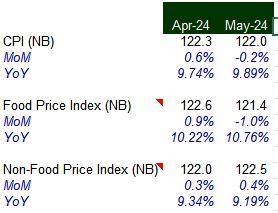Analyzing Bangladesh's Rising Inflation: The Impact of Monetary Policy and External Factors

By Asif Khan, CFA
Chairman
EDGE AMC Limited
Posted on: 30 May, 2024
Yesterday BBS reported inflation numbers for May 2024. CPI rose to 9.89% from 9.74% (April). Food inflation rose to 10.76% from 10.22% and non-food inflation fell to 9.19% from 9.34%. So why is inflation rising even though we have tightened monetary policy?
The table below shows month-over-month (MoM) inflation along with year-over-year (YoY). Overall inflation fell 0.2% MoM. Overall food inflation fell 1% MoM. Non-food inflation rose 0.4% MoM, equating to an annualized rate of 4.9%. The YoY number looks high because there were months of higher inflation between May 2023 and May 2024. Overall BBS numbers for food inflation do not contradict EDGE calculations with alternate data sets directionally (we can still argue and debate the actual levels).
The whole argument of hiking interest rates to tame inflation is like this
1. Higher interest rates can help stem the outflow of FX Reserves by slowing down the economy. Therefore we should see a more stable BDT driven by true market forces (not artificially fixed levels).
2. Lower future currency depreciation and lower purchasing power will help reduce inflation.
Currency markets are indeed showing some signs of stabilization. But this is also subject to external forces such as energy prices etc. So we need to observe further to conclude anything definitively.
Secondly, we must consider electricity price hikes and weather-related shocks while projecting inflation. Both of these are going to happen and may significantly slow down the rate at which inflation can come down. However, a slower decline in the inflation rate does not make the policy of higher interest rates wrong.
The MoM decline in food inflation in May is simply an adjustment of the Ramadan and post-heat wave price hikes. The real results will be clearer around 6 to 12 months down the road once the new lending rates (~14%) start to come into effect.

- Tags:
- Bangladesh inflation analysis, CPI trends, monetary policy impact, food and non-food inflation, interest rates, FX reserves, economic stability, price hikes
Search
Categories
Recent Post
-
EDGE Government Security Index (EDGEGSI) Starts 2025 with Strongest January Gain Since 2010
18 Feb, 2025 -
Analyzing September 2024 Inflation: Signs of Easing Price Pressures Amid Base Effects
03 Oct, 2024 -
Bangladesh Equity Market Outlook: Low Valuations and Future Growth Potential Amid Political and Economic Uncertainty
02 Oct, 2024 -
Assessing Currency Risks for Bangladesh: Why the Worst May Be Over for the BDT
29 Sep, 2024 -
Bangladesh 10Y Bond Yield Spread Hits 8.71%: Exploring the Investment Potential and FX Risk
28 Sep, 2024
Have Any Question?
If you have any questions feel free to reach out to us via phone or email.